Overview
A hybrid integration platform serves as a vital solution for organizations aiming to connect and integrate applications, data, and processes across both on-premises and cloud environments. This capability significantly enhances operational efficiency and flexibility. But how does this work in practice? Such platforms empower businesses to leverage their existing legacy systems while seamlessly adopting new technologies. As a result, organizations can facilitate faster digital transformation and improve their responsiveness to market changes. The integration of these systems is not just beneficial; it is essential for staying competitive in today’s fast-paced environment.
Introduction
In a world where digital transformation is not merely an option but an imperative, hybrid integration platforms (HIPs) have emerged as essential tools for organizations aiming to connect their diverse applications and data across both cloud and on-premises environments.
Avato’s innovative approach to hybrid integration empowers businesses to leverage the strengths of their legacy systems while embracing modern cloud technologies, creating a seamless flow of information that significantly enhances operational efficiency.
As organizations navigate the complexities of multi-cloud landscapes, the demand for robust integration solutions is surging. Projections indicate substantial growth in adoption rates, underscoring the urgency for businesses to adapt.
This article explores the defining characteristics, benefits, and real-world applications of hybrid integration platforms, illuminating how they can transform operations and drive success in an increasingly competitive marketplace.
Defining Hybrid Integration Platforms: An Overview
What is a hybrid integration platform? It serves as a crucial solution for organizations seeking to connect and incorporate applications, information, and processes across both on-premises and cloud environments. This platform empowers businesses to maximize the potential of their existing legacy systems while seamlessly adopting new cloud technologies, facilitating efficient data flow and operational effectiveness.
In today’s complex IT landscapes, where many organizations operate within multi-cloud environments alongside traditional on-premises systems, understanding a hybrid integration platform is essential. It offers a cohesive structure for combining systems, allowing organizations to optimize processes and improve flexibility in addressing changing market requirements. The market for hybrid unification systems is anticipated to undergo substantial expansion, with adoption rates predicted to increase dramatically in 2025 as companies progressively acknowledge the necessity for strong unification solutions.
Current data shows that organizations utilizing Avato’s hybrid unification system report enhanced operational efficiency and decreased unification times. For instance, organizations that have adopted these systems can link legacy technologies with cloud solutions in a matter of weeks, instead of months, significantly accelerating their digital transformation efforts. This capability is exemplified by Avato’s successful applications in financial organizations, such as Coast Capital, where the platform enabled significant system changes with minimal downtime, showcasing its effectiveness in practical situations.
Furthermore, remote and hybrid workers were found to be 22% happier and remained in their positions longer than those in a full-office model, emphasizing the positive influence of effective cohesion on employee satisfaction and productivity. Expert opinions highlight that a hybrid integration platform plays an essential role in contemporary IT environments. Industry leaders stress that as companies navigate the complexities of digital transformation, the ability to combine various systems securely and efficiently is critical.
As the demand for hybrid connection solutions continues to rise, staying updated on the latest trends and market knowledge will be vital for IT managers. The ongoing development of Avato’s hybrid system not only addresses current challenges but also enables organizations to adapt to forthcoming technological advancements, ensuring their competitiveness in their respective sectors. Additionally, the iPaaS market report indicates detailed segmentation by cloud type, service type, and industry verticals, providing valuable context for banking IT managers seeking to navigate this growing market.
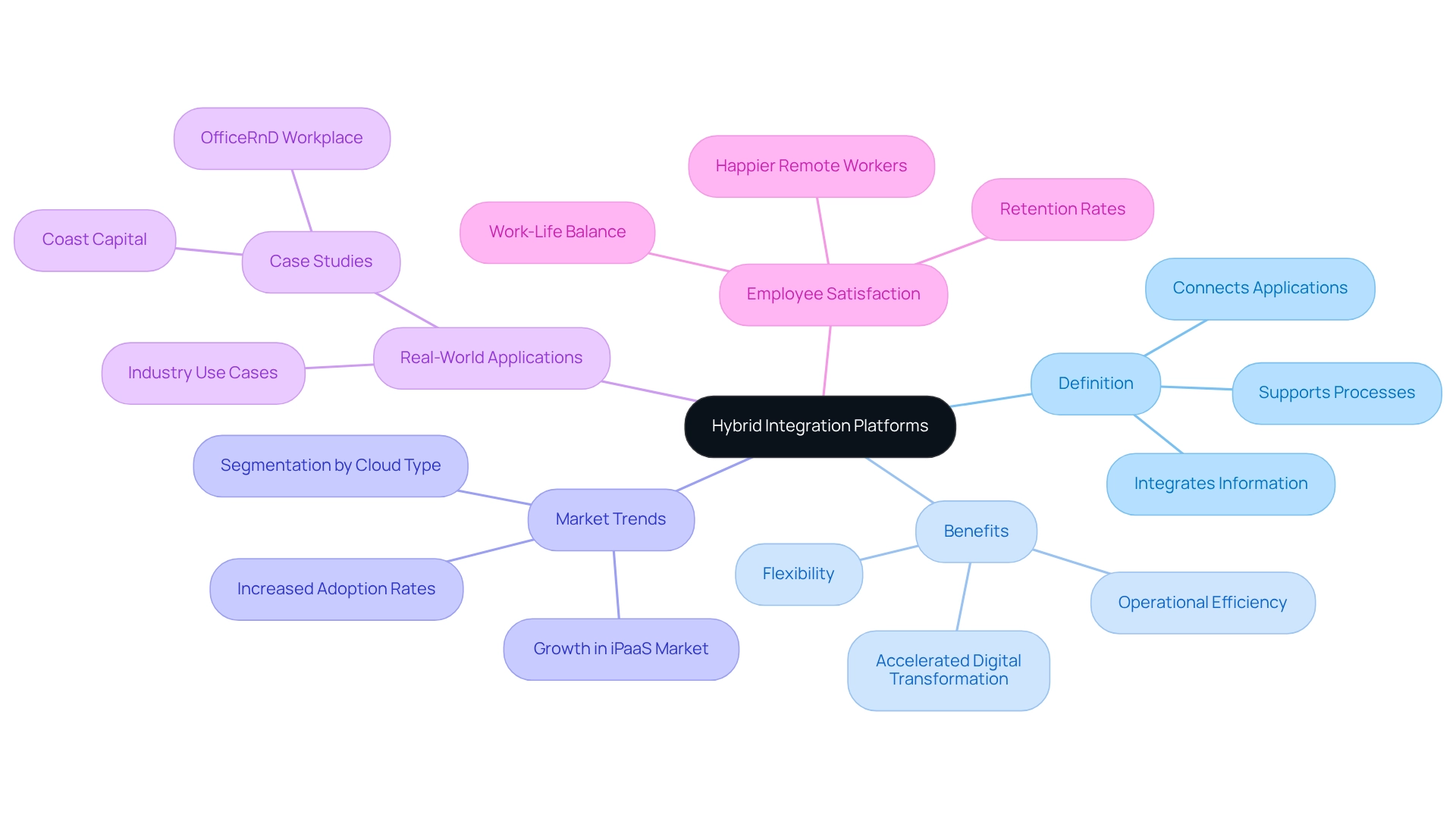
Key Characteristics of Hybrid Integration Platforms
Hybrid integration platforms (HIPs) are characterized by several essential features that significantly enhance their functionality compared to traditional integration solutions.
- Multi-Cloud Support: HIPs empower organizations to seamlessly integrate applications and data across various cloud environments, providing the flexibility and scalability necessary to adapt to evolving business needs. This capability is increasingly vital as enterprises adopt multi-cloud strategies to optimize performance and cost. In 2025, the demand for multi-cloud assistance in hybrid systems is expected to increase considerably, fueled by the necessity for organizations to refine their cloud strategies and improve operational efficiency.
- Support for Diverse Connection Patterns: These platforms accommodate a wide range of connection styles, including real-time, batch, and event-driven connections. This adaptability enables companies to choose the most appropriate method for their particular operational needs, ensuring effective information flow and system interoperability. Avato’s Hybrid Integration Platform exemplifies a hybrid integration platform by simplifying complex integrations, enabling organizations to maximize the value of their legacy systems while significantly reducing costs.
- Robust Security Features: Given the sensitive nature of the information being integrated, HIPs are equipped with advanced security measures designed to protect the information both in transit and at rest. As organizations face increasing scrutiny regarding data privacy and compliance, these security features are critical for maintaining trust and safeguarding sensitive information. Successful multi-cloud implementation requires careful planning, effective management, and a strong focus on security and compliance.
- User-Friendly Interfaces: Many HIPs showcase intuitive designs that streamline the connection process, making it accessible to users with varying levels of technical expertise. This simplicity of use accelerates deployment and lowers the learning curve, allowing teams to concentrate on strategic initiatives instead of becoming overwhelmed by complicated setup tasks.
- Live Monitoring and Analytics: These systems frequently feature extensive tools for overseeing performance and analytical functions that offer valuable insights into data flows and system interactions. Such features are essential for proactive management and enhancement of connection processes, allowing organizations to respond swiftly to any issues that may arise. The system guarantees ongoing observation and notifications regarding performance, which is vital for upholding uptime and dependability in fields such as banking, healthcare, and government.
- Cost-Saving Benefits: Understanding what a hybrid integration platform entails reveals that it not only simplifies complex connections but also significantly lowers operational expenses, making it a financially sound choice for organizations aiming to enhance their connectivity capabilities.
- Benefits of XSLT for XML Transformation: The connection features of Avato’s system are further improved by the benefits of XSLT, which enables efficient querying and transformation of XML content. This guarantees that organizations can convey information in innovative manners and generate new data from existing frameworks, simplifying their incorporation procedures.
As the landscape of hybrid unification continues to evolve, the incorporation of emerging technologies such as AI and edge computing is expected to further enhance these platforms’ capabilities. The anticipated increase in multi-cloud usage highlights the significance of strong connectivity solutions that can accommodate various environments while ensuring adherence to security regulations. This trend is reflected in the growing investor interest in FinOps practices, which aim to streamline cloud cost management and drive innovation across industries.
As noted by Gustavo Estrada, a customer, “Avato simplifies complex projects and delivers results within desired time frames and budget constraints,” underscoring the effectiveness of HIPs in addressing the challenges organizations face.
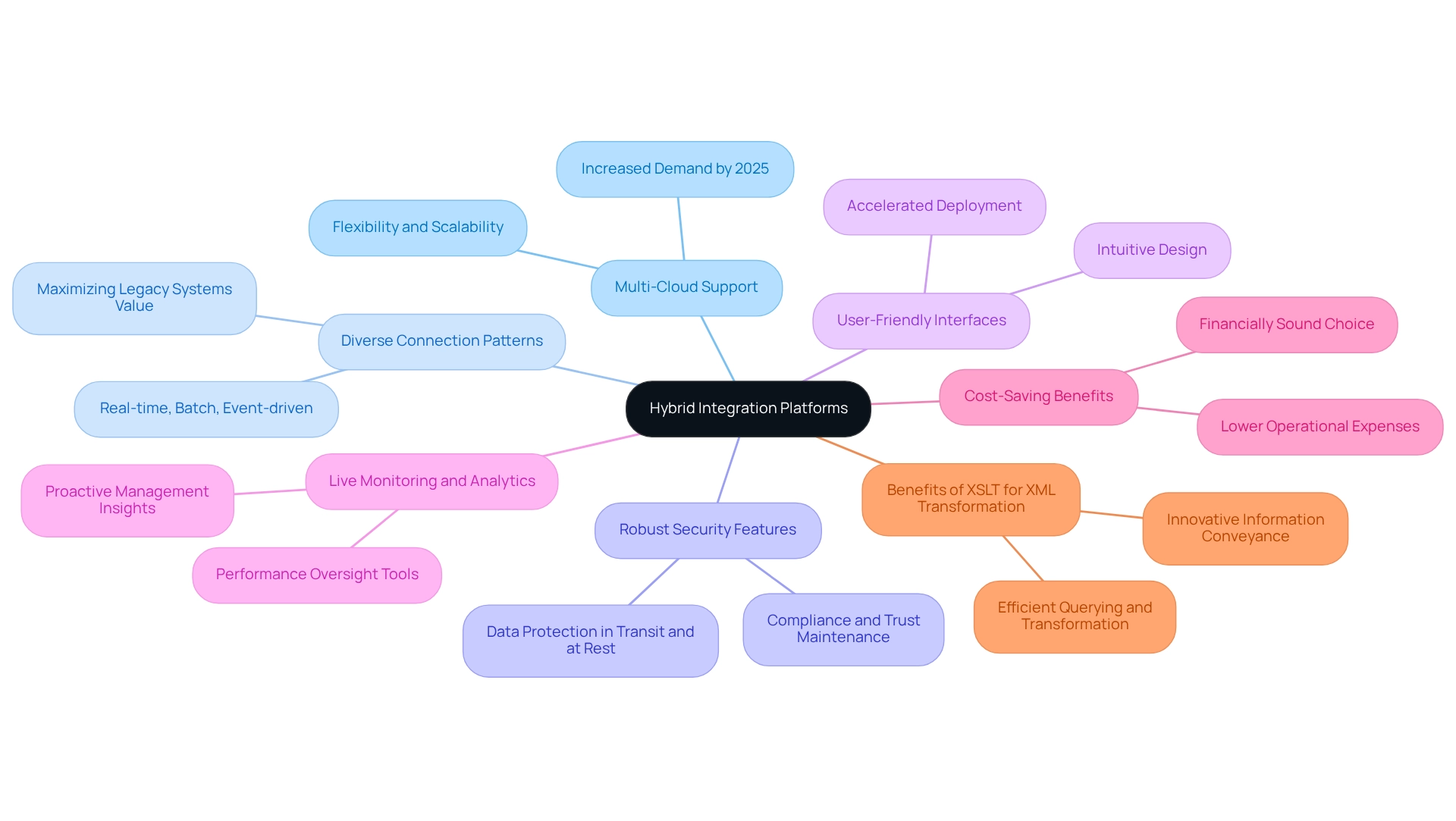
Benefits of Adopting a Hybrid Integration Platform
Embracing a hybrid platform (HIP) offers numerous advantages for organizations, particularly in the financial sector.
-
Enhanced Agility: HIPs empower businesses to swiftly adapt to evolving market conditions by enabling the rapid integration of new applications and services. For instance, Coast Capital’s experience highlights this agility, as they supported multiple interfaces and facilitated major system transitions with minimal downtime, significantly improving operational responsiveness.
-
Cost Efficiency: By optimizing the use of existing legacy systems alongside new cloud solutions, organizations can effectively reduce operational costs tied to maintaining various disparate systems. A notable collaboration with a major schedule-one Canadian bank illustrates this efficiency, allowing different core banking systems to function as a cohesive unit without requiring alterations, resulting in substantial cost savings.
-
Enhanced Information Accessibility: HIPs break down information silos, allowing seamless access to knowledge across diverse systems, thereby enhancing decision-making and operational efficiency. Understanding what a hybrid integration platform entails is crucial; it is designed to unlock isolated assets, providing a connected foundation that simplifies and standardizes data access, ultimately fostering data-driven decision-making.
-
Faster Time to Market: With streamlined connection processes, organizations can introduce new products and services more rapidly, securing a competitive advantage in their markets. The organization’s capability to facilitate swift changes is exemplified by the 63-second interruption during the transition of Coast Capital’s telephone banking system, underscoring their commitment to minimizing downtime and accelerating product delivery—essential for customer satisfaction.
-
Scalability: As companies grow, HIPs can seamlessly expand to accommodate larger data volumes and additional applications, ensuring that connectivity capabilities align with business needs. The system supports 12 levels of interface maturity, enabling organizations to balance implementation speed with the complexity necessary to future-proof their technology stack.
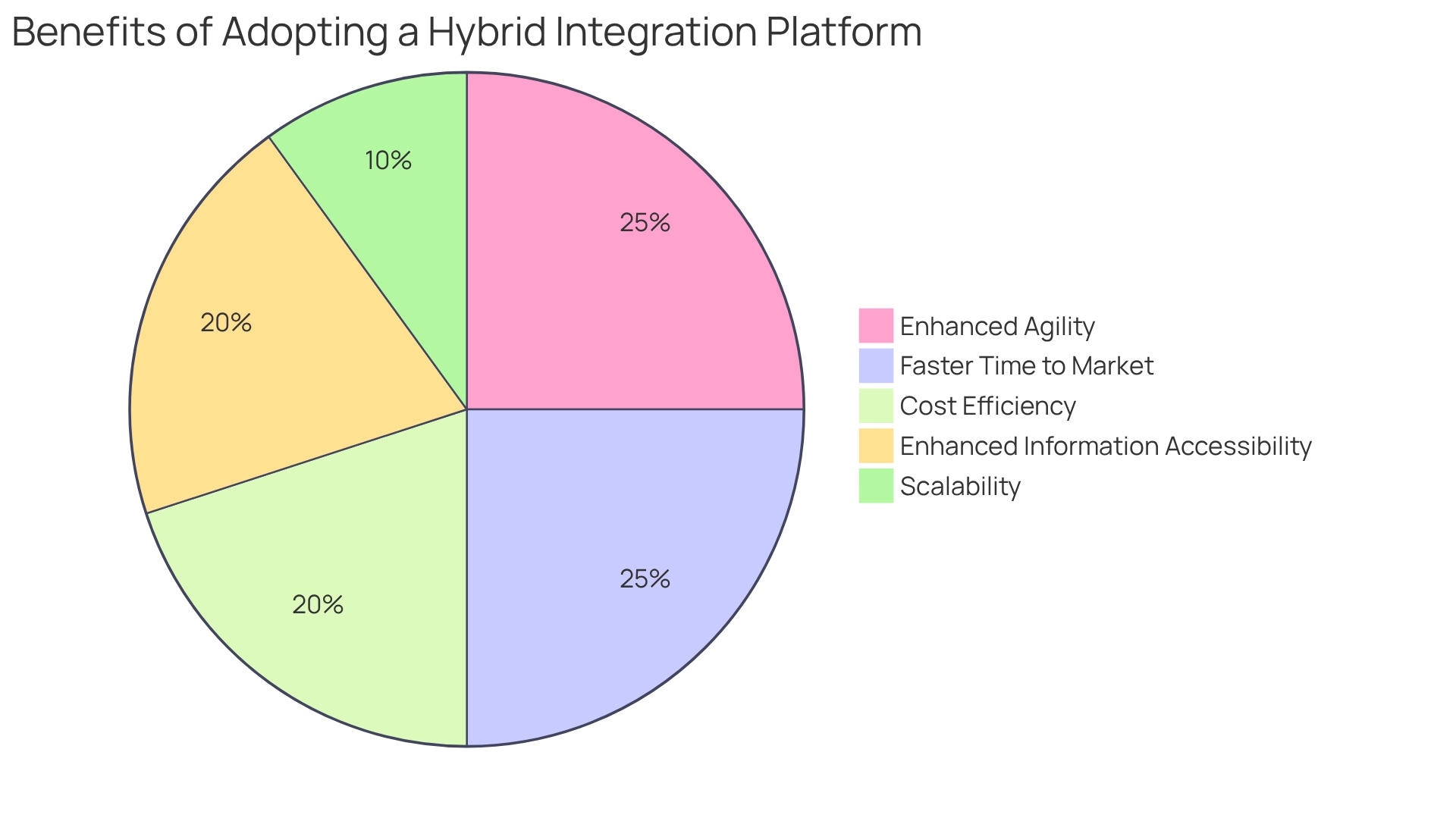
Core Capabilities of Hybrid Integration Platforms
Core capabilities of a hybrid integration platform include:
- Information Integration: Avato’s Hybrid Integration Platform (HIP) provides robust tools for merging information from diverse sources. This ensures consistency and accessibility of details throughout the organization, maximizing the value of legacy systems. By leveraging existing assets effectively, businesses can also reduce costs associated with data management.
- API Management: The platform encompasses tools for overseeing APIs, enabling organizations to develop, release, and track APIs that facilitate seamless connectivity between applications. This capability simplifies complex integrations and enhances overall operational efficiency, leading to significant cost savings.
- Workflow Automation: The HIP streamlines business processes by automating information flows and application interactions. This significantly decreases manual intervention and mistakes, resulting in cost savings and improved productivity.
- Real-Time Information Processing: Many HIPs, including Avato’s, support real-time information processing. This allows organizations to react swiftly to changes and events as they arise, maintaining a competitive advantage in fast-paced environments while contributing to overall cost efficiency.
- Monitoring and Analytics: The system offers extensive monitoring tools that provide insights into performance, helping organizations identify and address issues proactively. Ongoing monitoring and analytics are crucial for optimizing system performance and ensuring that frameworks operate at peak efficiency, resulting in additional cost savings.
By leveraging these essential capabilities, enterprises gain a clearer understanding of what constitutes a hybrid integration platform. They can access isolated resources, enhance information management, and generate substantial business value—all while maintaining compliance and integrity through the use of schemas. Additionally, the benefits of XSLT for XML data transformation further enhance the system’s functionality, enabling more efficient data management and processing. Avato’s commitment to simplifying complex connections and enhancing business value is rooted in its dedication to providing innovative solutions that address the evolving needs of organizations.
Challenges in Implementing Hybrid Integration Platforms
Implementing a hybrid integration platform presents a distinct set of challenges that organizations must navigate. One of the primary obstacles is Integration Complexity. Organizations often grapple with the intricacies of integrating multiple systems, particularly when legacy technologies are involved.
To enhance collaboration strategies, it is imperative to effectively mobilize stakeholders, ensuring that requirements are accurately captured from the outset. Another significant challenge is Data Security and Compliance. Safeguarding data and adhering to regulations can be particularly daunting when sensitive information is integrated across diverse environments. Avato emphasizes the importance of regulatory compliance and security audits within a hybrid integration platform, aiding organizations in managing these complexities.
Change Management also poses a hurdle. Resistance from staff accustomed to existing systems can hinder the successful adoption of new unification solutions. Investing in comprehensive training programs and implementing robust change management strategies are essential for cultivating a culture of innovation and ensuring staff comfort with the new platform.
Furthermore, organizations may face difficulties in finding qualified individuals who possess a deep understanding of hybrid integration platforms and are skilled in the associated technologies and methodologies. The company’s specialized unification services assist enterprises by providing access to proficient collaboration partners, effectively addressing these skill shortages.
Cost Considerations must also be taken into account. While hybrid systems have the potential to reduce long-term expenses, the initial investment in technology and training can be significant, necessitating meticulous budgeting and planning. Avato’s global partnership services can facilitate digital transformation, making the investment more manageable and strategically aligned with business objectives.
Real-World Use Cases for Hybrid Integration Platforms
Hybrid systems (Hips) have demonstrated their effectiveness across various sectors, underscoring their versatility and significant impact on operational efficiency. Notable implementations include:
- Healthcare: A leading hospital network successfully connected its electronic health record (EHR) systems with cloud-based patient management applications utilizing a hybrid connection platform. This combination greatly enhanced patient care and improved information accessibility, addressing the crucial need for smooth information flow in healthcare environments. With the increasing volume of health data, as highlighted by recent industry trends, such integrations are essential for effective data management. As Gustavo Estrada observed, the platform simplifies complex projects and delivers results within desired time frames and budget constraints, making it a valuable asset in healthcare.
- Banking: The company has demonstrated its expertise in the banking sector, particularly through its work with Coast Capital, where it facilitated seamless transitions with minimal downtime. The solution became operational in February 2013, and in June 2016, the company enabled the transition of Coast Capital’s entire telephone banking and contact center telephony system with only a 63-second outage. A major bank implemented a hybrid solution to connect its outdated core banking systems with contemporary mobile banking applications. This strategic move not only enhanced customer experience but also streamlined operational efficiency, allowing the bank to respond swiftly to evolving market demands. Avato’s system allows various core banking solutions to function as a single entity, significantly lowering expenses and enhancing customer satisfaction. Statistics show that the use of hybrid unification systems in the banking sector is increasing, with many institutions acknowledging the necessity for agile and secure unification solutions.
- Retail: A retail chain adopted a hybrid unification system to consolidate its inventory management processes across different locations. This combination offered real-time insight into inventory levels, facilitating improved supply chain management and minimizing the likelihood of stockouts or excess inventory situations.
- Manufacturing: A production company employed a hybrid system to link its manufacturing processes with cloud-based analytics tools. This unification enabled real-time oversight and enhancement of production processes, resulting in improved efficiency and lowered operational expenses. A governmental organization utilized a hybrid connection system to merge distinct departmental frameworks, improving information sharing and cooperation among different agencies. This unification is essential for enhancing service delivery and guaranteeing that vital information is easily accessible to decision-makers.
These practical examples illustrate what constitutes a hybrid integration platform and its transformative capability, especially in fields where secure and effective information merging is critical. The US Institute of Medicine reports that medical mistakes kill three individuals out of every 400,000 people each year, underscoring the necessity of effective data integration in healthcare. As organizations persist in managing the intricacies of digital transformation, the importance of Hips in enabling smooth connectivity and operational excellence will become increasingly vital, particularly with functionalities such as real-time monitoring and alerts that the company provides.
The company’s commitment to designing the technological foundation necessary to enable rich, connected customer experiences is apparent in every project, guaranteeing that clients obtain the highest level of service and support.
Hybrid Integration Platforms vs. iPaaS: A Comparative Analysis
While both hybrid integration platforms and hybrid integration platform as a service (iPaaS) solutions aim to facilitate integration, they differ in several key aspects.
Deployment Model: Hybrid integration platforms allow for implementation on-premises, in the cloud, or in a hybrid setting, providing the flexibility required to accommodate diverse organizational needs. In contrast, iPaaS solutions are typically cloud-based.
Integration Flexibility: The hybrid integration platform excels in connecting legacy systems with contemporary applications, making it an ideal option for organizations seeking to bridge the gap between outdated and modern technologies. iPaaS solutions, however, are often more suited for cloud-to-cloud integrations. Organizations using hybrid integration platforms enjoy greater control over their integration processes, leading to a better understanding of their needs and allowing for tailored solutions that meet specific business requirements. In comparison, iPaaS solutions may have limitations in customization.
Cost Structure: While hybrid integration platforms may entail greater initial expenses due to essential infrastructure investments, they significantly lower long-term operational costs by optimizing the value of legacy systems. In contrast, iPaaS solutions frequently function on a subscription basis, which can be more economical for certain organizations but may not offer the same long-term savings as the alternative approach.
Scalability: Hybrid integration platforms are designed for scalability across both cloud and on-premises systems, making them suitable for organizations with diverse IT landscapes. In contrast, iPaaS solutions are primarily designed for rapid scalability in cloud environments, which may not meet the needs of all businesses, especially in sectors like banking, healthcare, and government.
Real-Time Monitoring: Features of hybrid integration platforms include real-time oversight and notifications regarding system performance, enabling organizations to proactively handle their connections and respond to issues as they arise.
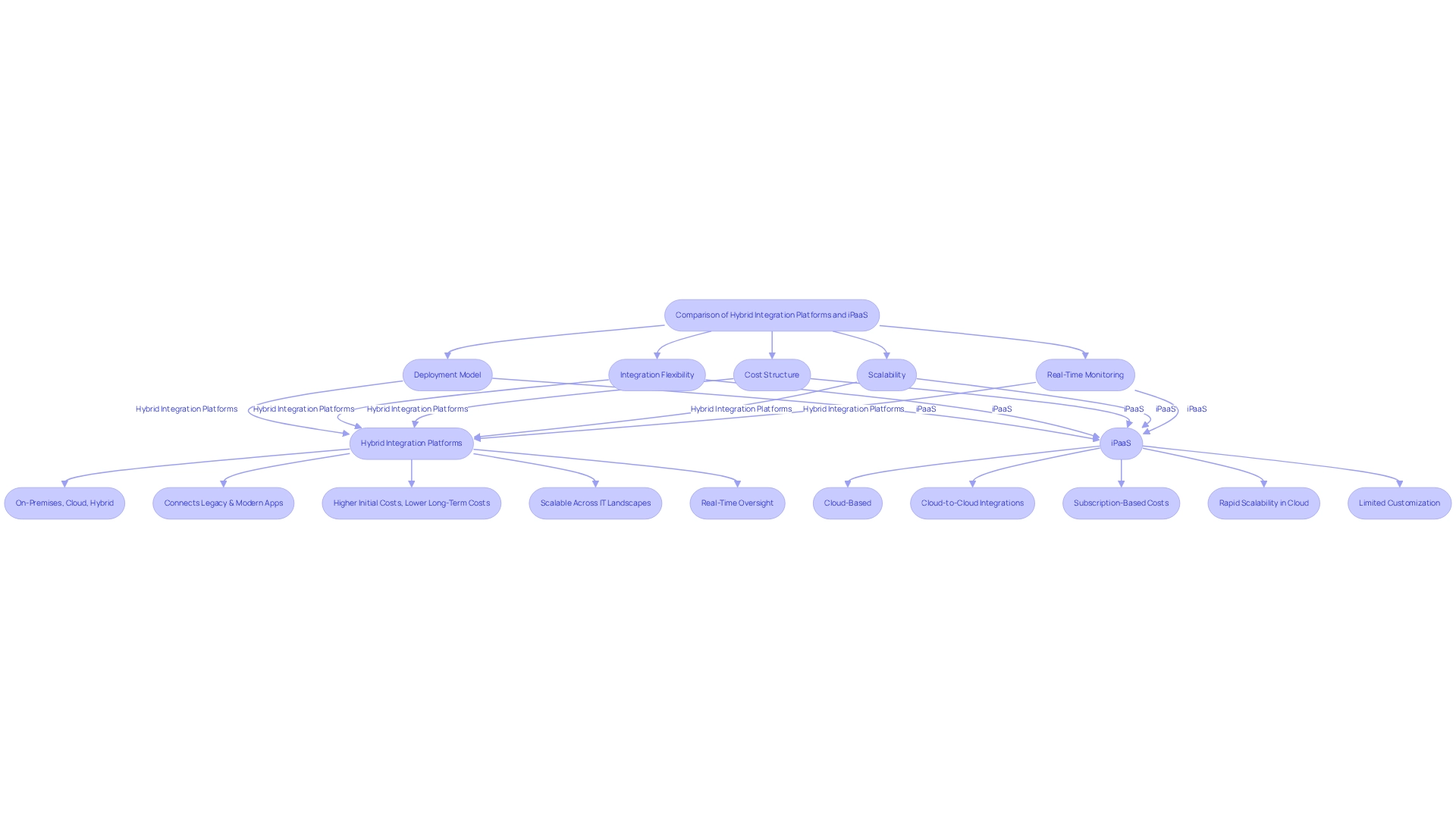
Choosing the Right Hybrid Integration Platform for Your Business
When selecting a hybrid integration platform, organizations must thoroughly evaluate several key factors to ensure they make an informed decision that aligns with their operational goals:
- Connection Requirements: Begin by assessing the specific connection needs, including the categories of systems and applications that must be linked. Understanding these requirements is crucial, as 60% of organizations report that unification challenges hinder their ability to deliver effective digital experiences. To grasp the essence of a hybrid integration platform, consider Avato’s solution, designed to address these challenges by streamlining the connection of isolated legacy systems and fragmented information, thereby enabling organizations to provide seamless digital experiences.
- Scalability: It is imperative to choose a system that can efficiently expand to support future growth and larger volumes of information. A scalable solution ensures that as business needs evolve, connectivity capabilities can grow without necessitating major revisions.
- Security Features: In light of the increasing sophistication of cyber threats, evaluating the security measures in place is essential. Organizations should seek systems that implement robust security protocols to protect sensitive information during integration processes. As Darren Guccione, CEO and Co-Founder, emphasizes, “IT leaders must implement a multi-layered approach to security that addresses the most prevalent existing threats and combats the malicious cyber weapons of the future.” This highlights the critical importance of strong security measures in hybrid systems.
- User Experience: The platform should feature a user-friendly interface that enhances usability for both technical and non-technical staff. A positive user experience can significantly boost productivity and reduce the learning curve associated with new technologies.
- Vendor Support: Evaluate the level of support and resources provided by the vendor, including training, documentation, and customer service. High vendor support satisfaction is vital, as it can influence the overall success of the integration project. Avato is dedicated to delivering exceptional customer support and training, ensuring that organizations have the necessary resources to succeed. Furthermore, engaging stakeholders early in the process can clarify requirements and streamline implementation, enhancing the adaptability of the integration solution.
- Cost: Finally, assess the total cost of ownership, which includes initial setup costs, ongoing maintenance, and potential savings from improved efficiency. A well-selected system can yield substantial cost savings while enhancing operational capabilities. Avato has received accolades from customers for delivering results within desired timelines and budget constraints, further underscoring its value proposition.
By thoughtfully evaluating these factors, organizations can understand what a hybrid integration platform entails, ensuring it meets their current needs while preparing them for future success in an increasingly digital landscape. Ongoing monitoring and enhancement of the integration solution will provide valuable insights, enabling organizations to refine their operations and uncover new opportunities for innovation. Obtain your copy now to discover how Avato can assist you in achieving your objectives.
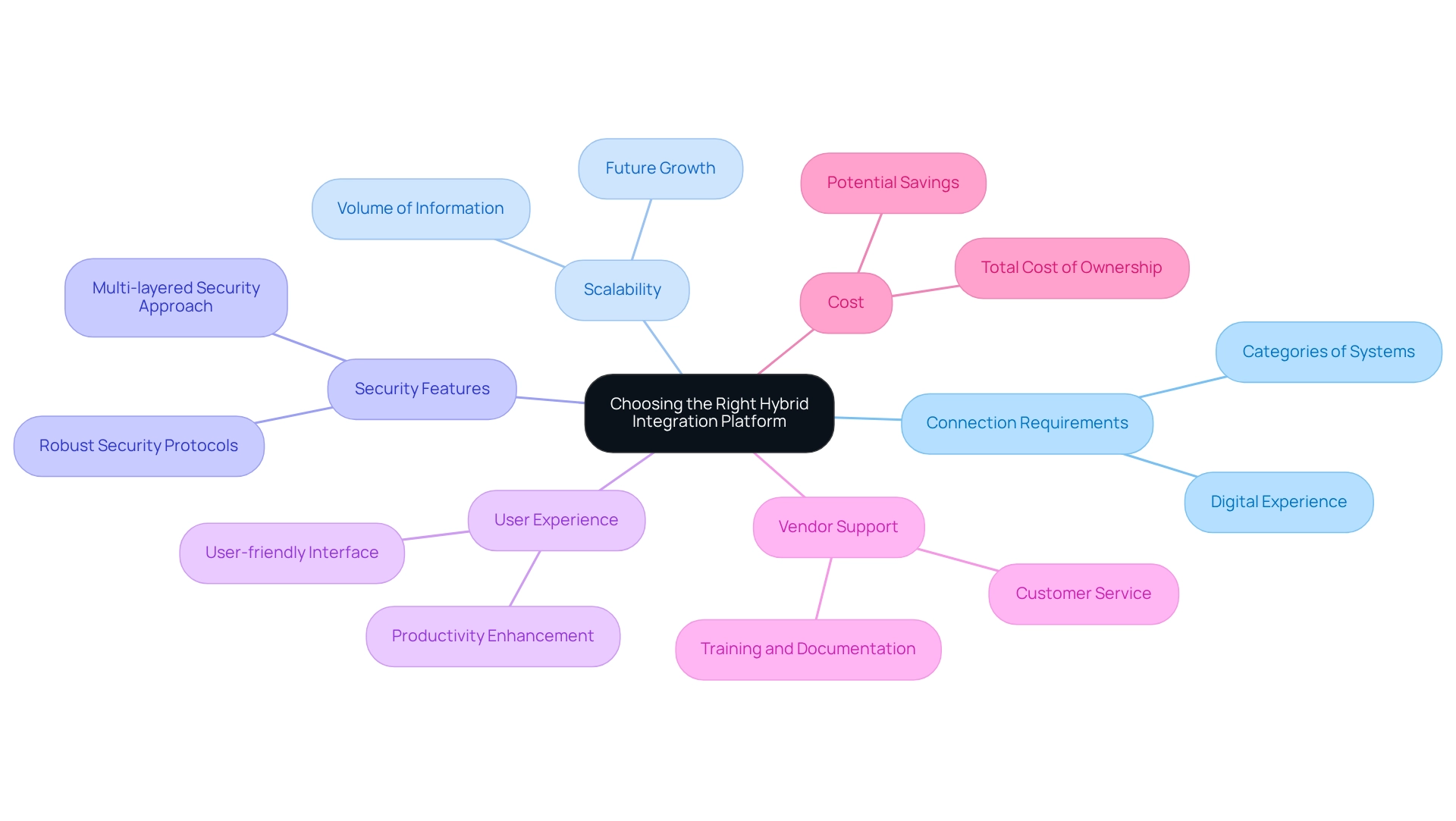
Future Trends in Hybrid Integration Platforms
The future of hybrid unification platforms is set for significant evolution, driven by several key trends.
- Heightened Utilization of AI and Automation: Organizations are increasingly leveraging artificial intelligence and automation to enhance assimilation processes, thereby improving efficiency and reducing manual intervention. The Hybrid Connection Platform exemplifies this trend, streamlining intricate linkages that enable companies to maximize the value of their legacy systems while significantly lowering operational expenses.
- Increased Emphasis on Security: As information breaches become more prevalent, hybrid connection platforms will prioritize advanced security features to protect sensitive information. The company is committed to delivering secure and efficient system unification, ensuring that customer data remains safeguarded throughout the integration process.
- Expansion of Multi-Cloud Strategies: Companies will continue to adopt multi-cloud approaches, necessitating robust hybrid connectivity solutions that can seamlessly link diverse environments. The system is designed to enhance this connectivity, allowing organizations to access isolated assets and generate business value across various cloud platforms.
- Combination of IoT Devices: The rise of the Internet of Things (IoT) will drive the demand for hybrid systems capable of managing and integrating data from an increasing number of connected devices. The company’s solutions are well-equipped to handle this influx of data, ensuring that organizations can effectively harness IoT technologies.
- Focus on Immediate Information Processing: Organizations will progressively require immediate information processing capabilities to respond swiftly to market changes and customer demands, prompting hybrid systems to evolve accordingly. Avato’s platform offers real-time monitoring and alerts on system performance, empowering businesses to remain agile and responsive in a fast-paced environment.
In summary, Avato, founded by a team of dedicated enterprise architects, is at the forefront of pioneering solutions that elucidate the concept of a hybrid integration platform. This approach addresses current market demands while empowering businesses to future-proof their operations through seamless data and system integration.
Conclusion
Hybrid integration platforms (HIPs) have emerged as essential assets for organizations navigating the complexities of modern digital landscapes. By enabling seamless connectivity between legacy systems and contemporary cloud technologies, platforms like Avato’s empower businesses to enhance operational efficiency while reducing integration time and costs. The capacity to support diverse integration patterns, coupled with robust security features, positions HIPs as indispensable tools for organizations operating within multi-cloud environments.
The advantages of adopting a hybrid integration platform are numerous, ranging from improved agility and faster time-to-market to enhanced data accessibility and cost savings. Real-world applications across sectors such as healthcare, banking, and retail illustrate the transformative impact of HIPs on operational effectiveness and customer satisfaction. As organizations increasingly embrace digital transformation, the importance of effective integration solutions will only intensify, enabling them to respond swiftly to evolving market demands.
Looking ahead, the future of hybrid integration platforms is poised for further evolution, driven by trends such as increased adoption of AI, enhanced security measures, and the integration of IoT devices. By selecting the right HIP, organizations can position themselves to tackle current challenges while preparing for future success. Embracing these innovative solutions is crucial for maintaining a competitive edge in an increasingly interconnected world, underscoring the pivotal role that hybrid integration platforms will play in shaping the future of business operations.

